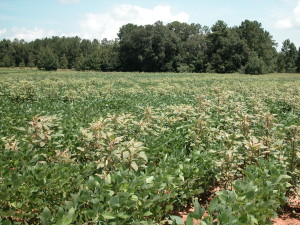Palmer amaranth is a weed known all too well by farmers in Columbia County. Its fast growth rate and resistance to herbicides is reason for concern among local producers. The weed can become an aggressive competitor against warm season crops, and a serious nuisance at harvest if not managed properly.
The Weed Science Society of America (WSSA) conducted a survey on the most troublesome weeds in the world. The results showed that Palmer amaranth, commonly known as Palmer pigweed, was ranked as the number one problem weed in the United States. Lee Van Wychen, Ph.D., of the WSSA stated, “This weed can have a devastating impact on crop yields. Its stems are tough enough to damage rugged farm equipment and it is extremely prolific. A single Palmer amaranth can produce as many as a million seeds during one growing season.”
Palmer amaranth has become one of the most significant weed pests of cotton, soybean and peanut producers in the southeast United States. Once established, it can be very hard to control due to its fast growth rate, heat tolerance, seed production and herbicide resistance; even chopping off the stem will not suffice. Scouting and timely intervention are critical for the control of Palmer amaranth.
For more information about Palmer amaranth: Amaranthus Palmeri
Source:
Posted by Sarah Chambers, Extension Intern

